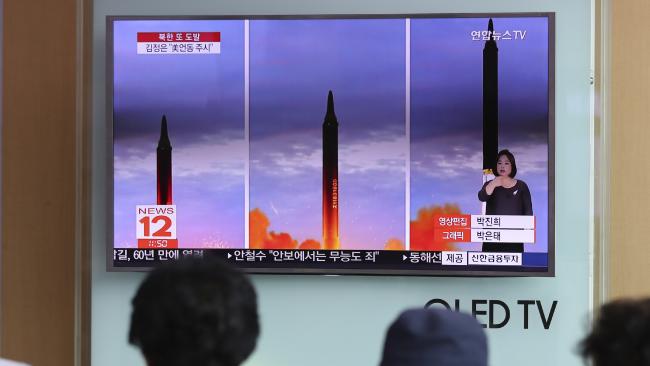IN THE MEDIA
Iran will follow Kim Jong-un’s lead in defying the world
September 13, 2017 | Shmuel Levin

Shmuel Levin
An edited version of this piece appeared in The Australian – 13 September 2017
Earlier this month, North Korea conducted its sixth nuclear test. According to South Korea’s parliamentary defence committee chief, the blast had the explosive power of 100,000 tons of TNT, making it four to five times stronger than the atomic bomb dropped on Nagasaki, Japan in 1945.
But while most of the world has watched North Korea’s increased nuclear activities with growing concern, one country has stood side-by-side with the North Korean regime throughout this entire time.
For at least ten years, Iranian officials have attended North Korean ballistic missile test-launches and maintained a presence at North Korean nuclear test sites. Moreover, Iran has granted North Korean scientists and technicians access to its own nuclear and ballistic missile facilities, and it has cooperated with North Korea on nuclear technology.
Iran’s own missiles are modelled on North Korea’s, and intelligence reports indicate that the two countries worked together on developing a miniaturised nuclear implosion device. According to a 2010 cable released by WikiLeaks, Iran obtained 19 advanced ballistic missiles from North Korea.
Only one month ago, North Korea fired a ballistic missile over Japan’s second largest island. But as the United Nations Security Council was targeting North Korea with fresh sanctions, Iran was instead hosting Kim Yong Nam, the head of North Korea’s Parliament.
Meanwhile, a new report in Britain’s Telegraph says that the British Foreign Office is investigating whether Iran helped Kim Jong-Un achieve recent advances in his drive to mount nuclear warheads on missiles.
Ironically, Iran now has a substantially increased supply of cash due to the lifting of sanctions under the Obama Administration’s nuclear deal. This means that as North Korea assists Iran with its missile and nuclear technologies, Iran can offer North Korea a rare source of hard currency.
In some ways, the two countries’ nuclear programs mirror each other. Both have devoted substantial resources to nuclear technologies, and both have proceeded in the face of international sanctions.
But the two nuclear programs are not exactly the same. At one level, North Korea’s program is the most immediate threat. Kim Jong-un’s regime has upped its bellicose rhetoric and taken increasingly provocative action in recent years.
However, North Korea’s nuclear policy is fundamentally a defensive deterrent to other countries. According to many experts, North Korea knows that any offensive action would be a suicidal move, and it is unlikely to attack another country. In any case, North Korea’s ambitions are largely confined to the Korean Peninsula.
But the same cannot be said of Iran. Iran is increasingly seeking to establish itself as the dominant power in the Middle East, well beyond its borders. Iran’s Hezbollah proxies are active in Lebanon and Iran maintains de facto control of parts of Iraq, Syria, and Yemen.
As the civil war in Syria is winding down, Iran is now seeking to establish a permanent military presence in the country. According to the Iranian armed forces Chief of Staff, the country may also seek to set up naval bases there and in Yemen. Elsewhere, Iran has threatened Saudi Arabia and Israel and actively aided the Shi’ite insurrection in Yemen.
For Iran then, nuclear technologies form part and parcel of its attempt to increase its regional influence. Just one month ago, Iran’s parliament overwhelmingly voted to spend a further $260 million on its ballistic missile program and approximately $300 million on activities by the Quds Brigade, the international arm of the Revolutionary Guards corps.
Moreover, Iran has learned much from North Korea on getting away with constructing a nuclear program as well as getting help with technology. Most recently, Iran has insisted that its military sites are off-limits to nuclear inspectors.It was North Korea’s refusal to allow the International Atomic Energy Agency access to military sites in the mid 1990s, which first triggered an 18-month nuclear crisis.
Iran has also learned from North Korea that limited nuclear deals can be exploited. The Iranian nuclear deal allows Iran to keep a significant number of advanced centrifuges and continue with research and development. But, it was North Korea which first negotiated a nuclear deal that only froze its existing programs, but allowed it to maintain significant portions of its existing infrastructure.
The Iran nuclear deal is set to expire in nine to 14 years, and the lifting of sanctions will see Iran emerge stronger than ever before. For now, the world is dealing with the repercussions of its North Korea policies. But, all the while, Iran is not far behind.
If there is one lesson from North Korea, it is that failure to act now to halt Teheran’s progress will have serious repercussions down the track. Iran’s hegemonic ambitions and destructive activities already extend well beyond its borders. Adding nuclear weapons to the mix will only likely ignite a very dangerous future crisis in what is already the world’s most fragile and unstable region.
Shmuel Levin is a policy analyst at the Australia/Israel & Jewish Affairs Council (AIJAC).
Tags: Asia, Iran, North Korea





